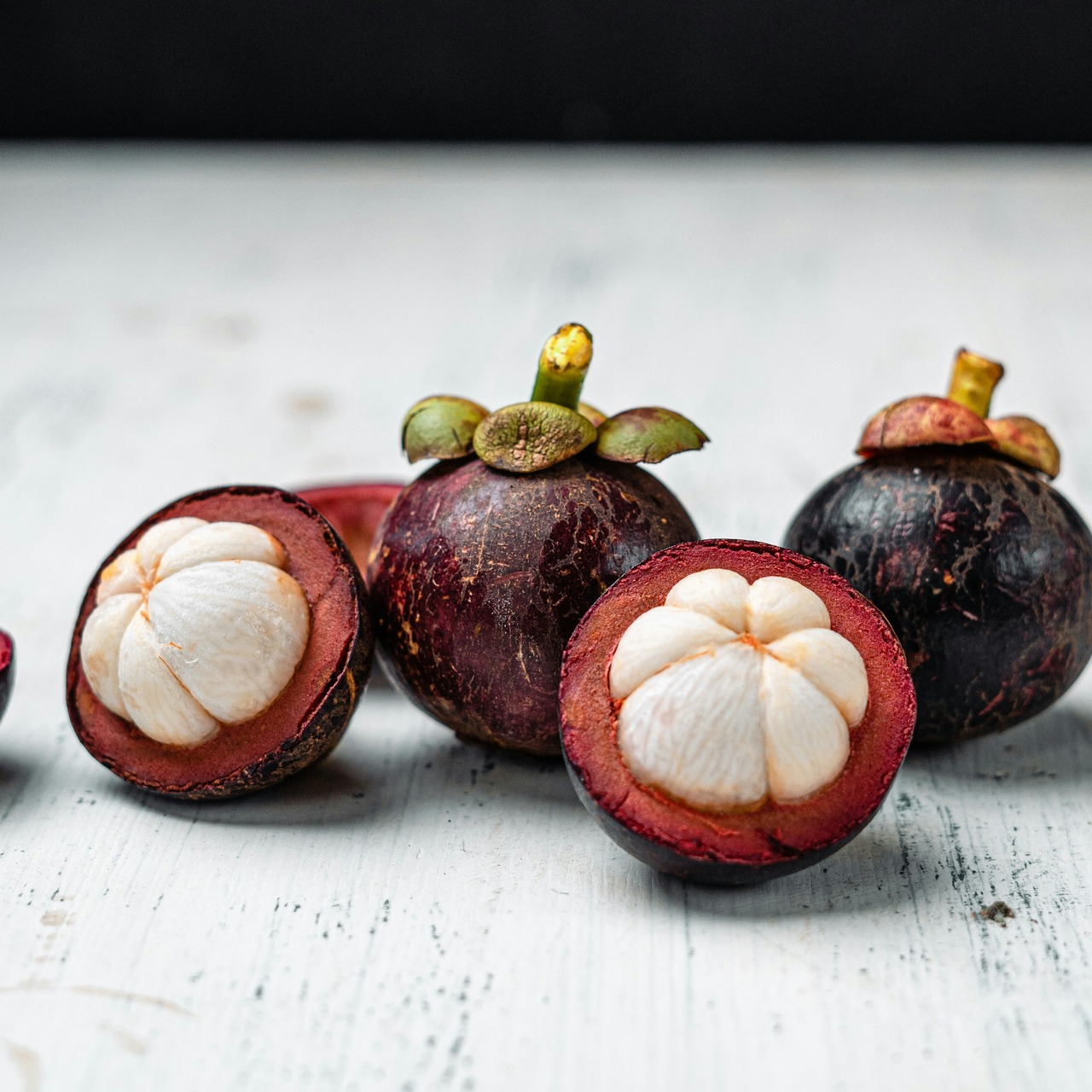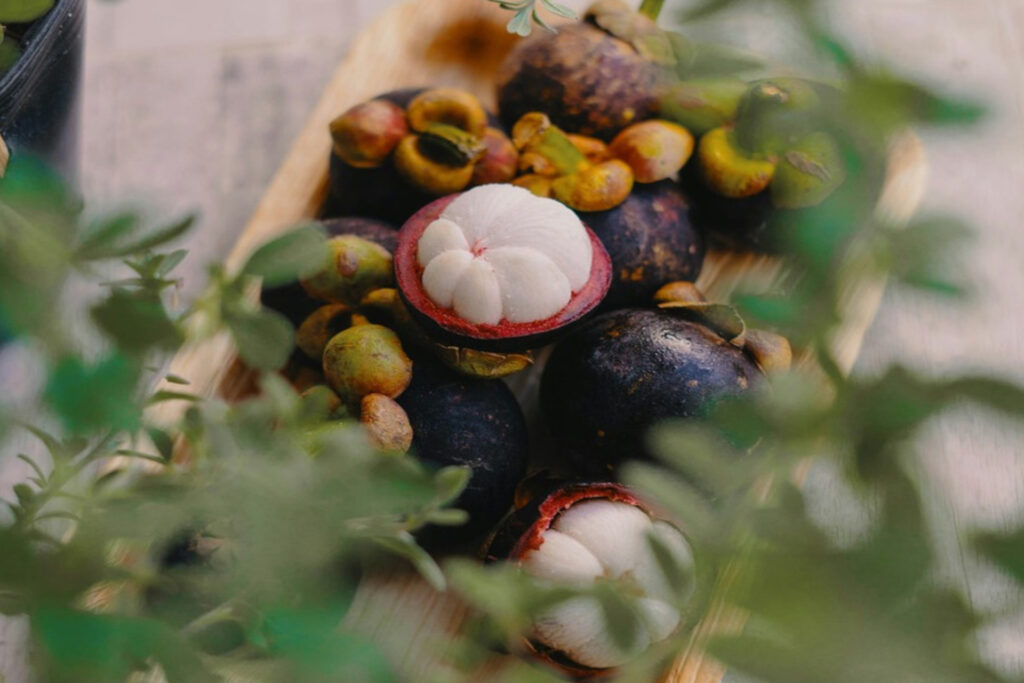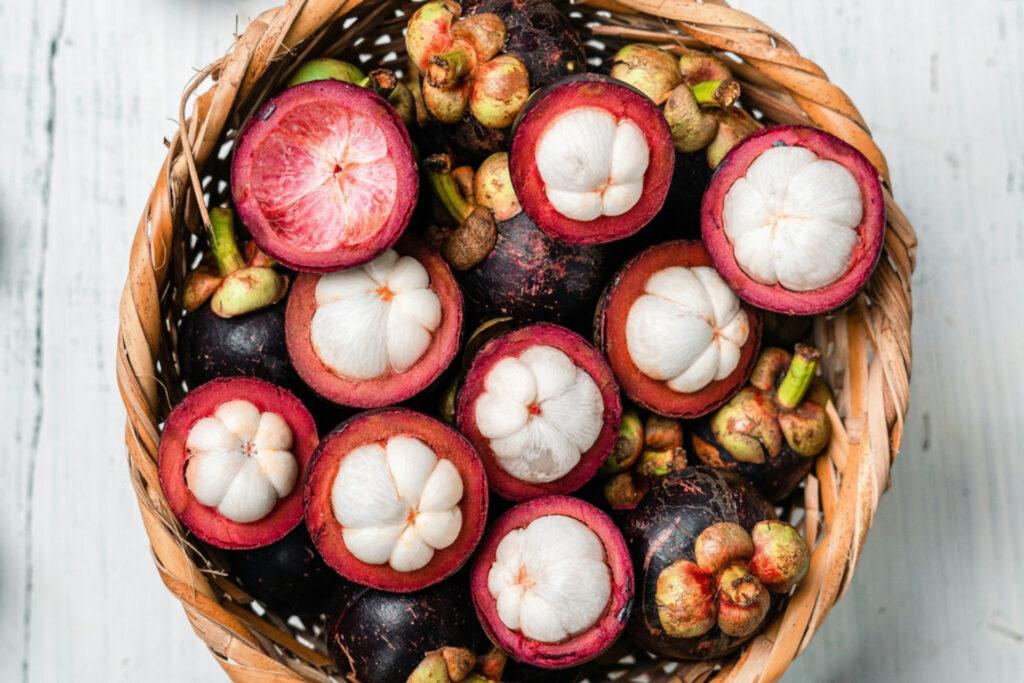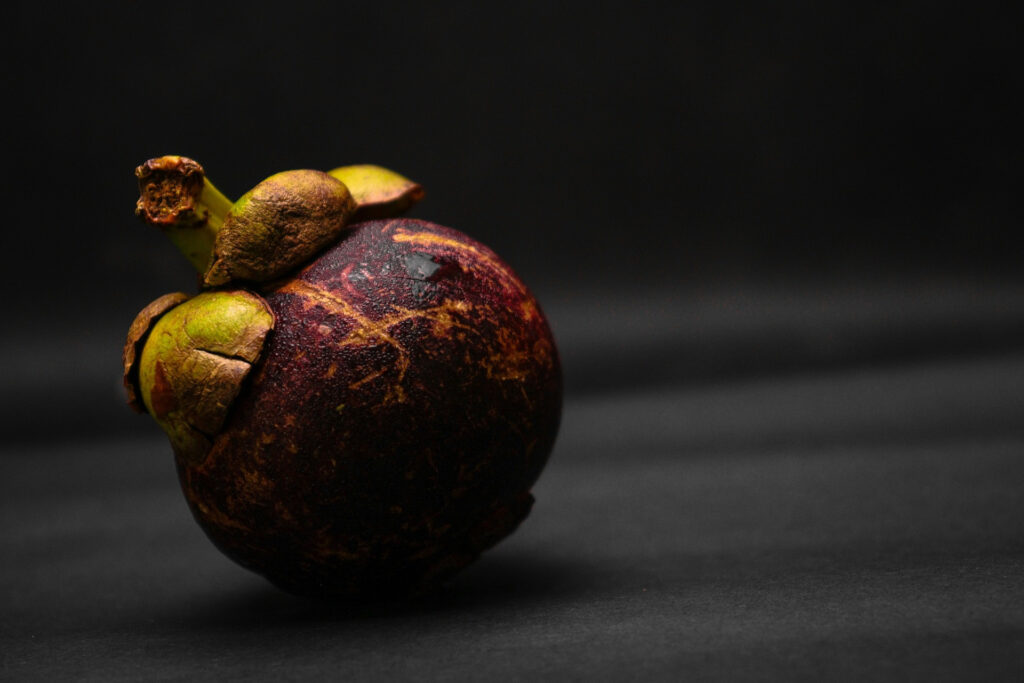
Body + Mind is reader-supported. We may earn an affiliate commission when you buy through some of the links on our site.
Mangosteen (Garcinia mangostana) is a tropical fruit, native to the rainforests of Southeast Asia. With its purple skin and juicy, flower-shaped, segmented fruit, it has a distinctive tangy-sweet taste. Think of a cross between peach, strawberry and vanilla. And no, it’s not related to the mango.
Traditional medicine has made good use of Mangosteen fruit, extract and tree bark for centuries to treat everything from dysentery to UTIs — but does this Queen of Fruit really have any health properties? And how do you eat this weird-looking thing? Let’s find out.
Yes, mangosteen is considered a superfruit because it is highly nutritious. It is rich in vitamins, minerals and fiber and also packed with age-defying antioxidants and other phytonutrients. What sets mangosteen apart from other superfruits, however, is the high concentration of xanthones.
Xanthones are biologically active chemical compounds that offer many health benefits. As antioxidants, they help control free radicals that damage cells, and they are also have anti-inflammatory, anti-cancer, and neuroprotective qualities. Xanthones are mostly found in fungi and lichen, but mangosteen has the highest concentration of xanthones in any food.

Because of its intense nutrition profile — and all those xanthones — Mangosteen has a number of health benefits and is currently being studied to potentially unearth even more. Here are just some of the good things we know mangosteen can help with.
Chronic inflammation can damage healthy cells and, over the long term, contribute to serious health problems such as arthritis, diabetes, cancer and heart disease. Research suggests that mangosteen’s anti-inflammatory properties could help to calm the body’s inflammation response, potentially protecting against these conditions.
Research has shown that mangosteen extract slows the growth of cervical cancer cells and it has also shown anti-cancer promise in several other laboratory and animal studies, including those looking into breast cancer and digestive cancers. It is important to note that this research is in its early stages, but it does appear that mangosteen is a natural cytotoxic agent that holds strong potential in this critical field.
Research into mangosteen for weight loss has shown promise that this delicious fruit could also help with maintaining a healthy weight due to the anti-obesity properties of xanthones. However, more research is needed in this area.
As any diabetic knows, the battle to keep blood sugar in check is real. The good news is that there is pretty solid evidence that mangosteen does have therapeutic potential against diabetes and its complications. Studies show that the fruit can lower blood glucose levels and insulin resistance.

Your complex immune system needs many things to thrive, but mangosteen, with its potent antibacterial properties, seems to help combat harmful bacteria. Your gut health is vital for a strong immune system, and mangosteen’s high fiber content is beneficial for your digestive system, so it’s potentially a double boost for your immune health.
Neurodegenerative diseases such as Alzheimer’s Disease and Parkinson’s are generally very challenging to treat and there is as yet no known cure for most such conditions. However, a recent study found that alpha-mangostin, a compound largely found in the fruit’s skin, had effects comparable to the drug memantine, used for treating moderate and severe dementia. Mangosteen is thought to work by reducing oxidative stress-induced cell death in neurons.
This is a highly significant finding, with more research sure to follow.
In a recent study, mangosteen extract showed promise in reducing plaque and gingivitis and perhaps also in healing periodontitis. This is believed to be due to the fruit’s anti-inflammatory and anti-bacterial properties. Watch out for a mangosteen mouthwash coming soon to a store near you.
Mangosteen is really easy to prepare. First, select your fruit. Look for one that has smooth, deep purple skin. It should feel slightly soft to the touch but not squishy, and it will feel a little heavy for its size. Avoid any that are too hard to the touch or leaking sap.
To prep the mangosteen, twist off the stem, if it is still attached, and use your thumbs in that hole to pry the skin off. Alternatively, use a serrated knife to cut shallowly around the fruit, not too deep, until you have created an opening for your fingers. The skin will easily pull off.
Inside, you’ll see a soft, white, flower-shaped fruit with one “petal” or segment larger than the others. You can eat all of these fruit segments, but the largest one may contain a seed, which you can just discard.

Mangosteen is delicious eaten raw, just like any other fruit. You can eat it just as it is, or you could pair it with other tropical fruits like pineapple and papaya for a sun-drenched tropical fruit salad.
You can also use mangosteen in salads, where its sweetness goes beautifully with leafy salad greens.
Alternatively, whizz it up into a delicious health-giving smoothie drink. It’s especially delicious with a coconut milk base and some banana.
Mangosteen has no side effects as such and is safe to consume in normal, moderate amounts.
However, you may want to avoid mangosteen if you are pregnant or breastfeeding, as there is insufficient evidence that it is safe for consumption at these times.
There is some evidence that mangosteen may inhibit blood clotting, so you should also avoid this fruit if you have a blood disorder. For this reason, you should also not eat mangosteen if you take anti-coagulant or antiplatelet medication.
Finally, mangosteen may interact with donepezil (Aricept), so do not eat it or use mangosteen supplements if you take this drug.
With so many potential health benefits plus a unique and delicious flavor profile, mangosteen is good for you in so many ways — this is definitely a superfruit that should be on your radar. Give the Queen of Fruits a try and see what you think!
Your email address will only be used to send you our newsletter, and at any time you may unsubscribe. For more information, see our Privacy Policy.